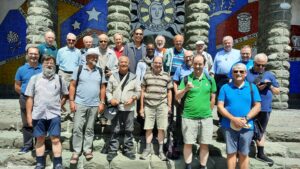Author Archives: Fraternidad Iesus Caritas
(Español) Noticias de Haití
(Español) FOUCAULD Unai Quirós
Eugenia, from Rwanda, new responsible of littles sisters or Jesus. General chapter in Tre Fontane, Rome, September 2023
Assembly Annecy, July 2023
 We are priests from European countries; Austria, Malta, Poland, Spain, France, Germany, UK, Ireland, Belgium, Switzerland and a few from other countries.
We are priests from European countries; Austria, Malta, Poland, Spain, France, Germany, UK, Ireland, Belgium, Switzerland and a few from other countries.
We belong to the Jesus Caritas Priests Fraternity living in the spirit of Charles de Foucauld.
In our Assembly, which takes place every three years, we listened to the reports from the different countries; the realities, the hopes, the sorrows and the inspiration of Charles de Foucauld.
Read the full document on PDF: Assembly Annecy 2023 eng


